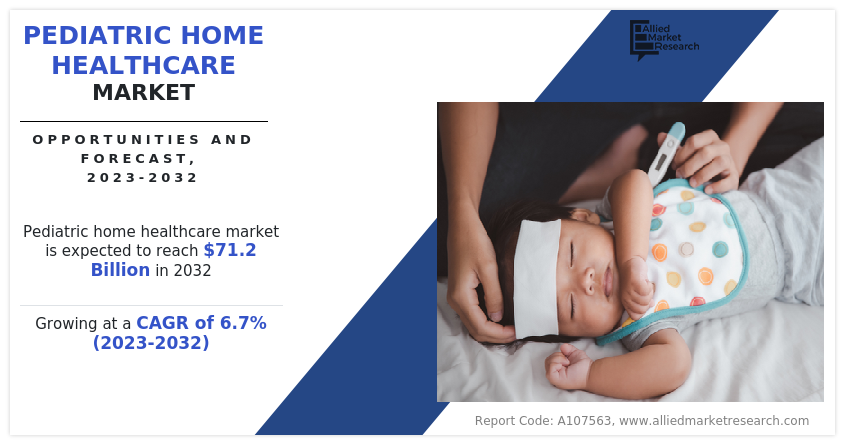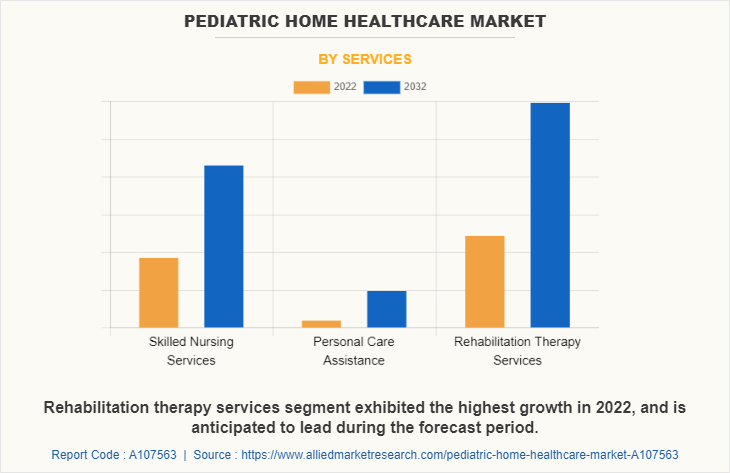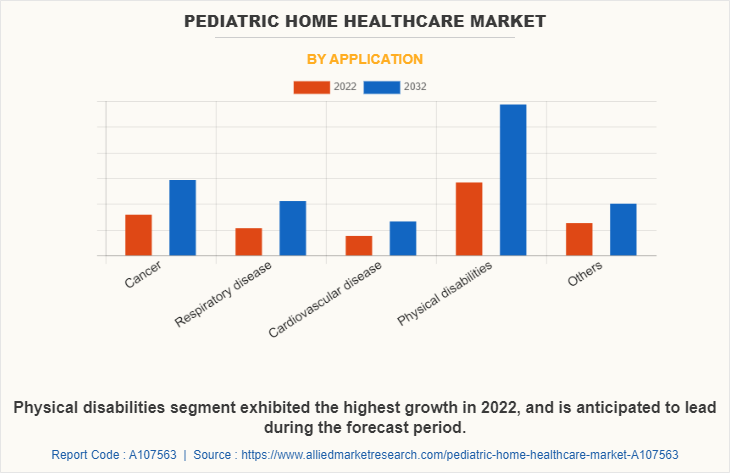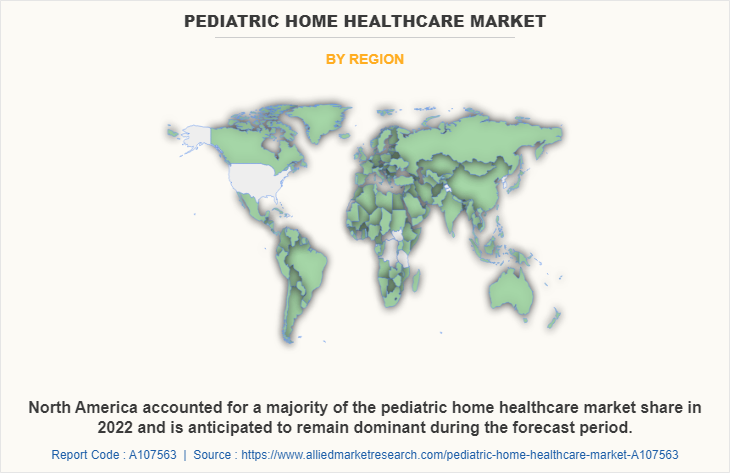Pediatric Home Healthcare Market Research, 2032
The global pediatric home healthcare market size was valued at $37.2 billion in 2022 and is estimated to reach $71.2 billion by 2032, growing at a CAGR of 6.7% from 2023 to 2032. Pediatric home healthcare is defined as services provided by professionals and paraprofessionals in the home, including nursing visits; extended private-duty nursing; physical, occupational, or speech therapy; and provision of durable medical equipment and services. It provides comprehensive, cost-effective care to optimize a child’s health at home, limiting hospitalizations and medical complications, relieving caregiver burden, and reducing health care costs. Moreover, it refers to medical care provided to infants, children, and adolescents in the comfort of their own home. It involves a range of health services and treatments delivered by qualified healthcare professionals, such as nurses, therapists and aids who specialize in caring for pediatric patients.

Market Dynamics
The surge in technological advancement in medical devices such as ventilators, continuous positive airway pressure (CPAP), gastric tubes, nebulizers, and apnea monitors that are used for providing continuous care and medical assistance at home to Children with Medical Complexities (CMC) and increase in prevalence of chronic diseases such as cerebral palsy, congenital heart diseases, cystic fibrosis, muscular dystrophy, epilepsy, and cancer in pediatric population worldwide are the major factors that propel the growth of the pediatric home healthcare market share. For instance, according to the Centers for Disease Control and Prevention (CDC) 2021, more than 40% of school-aged children and adolescents have at least one chronic health condition, such as asthma, obesity, other physical conditions, and behavior/learning problems. The healthcare needs of children with chronic illness can be complex and continuous and includes both daily management and addressing potential emergencies.
In addition, pediatric home healthcare services are often considered more cost-effective compared to hospital stays or frequent clinic visits. Home healthcare eliminates the need for prolonged hospital stays, which can be expensive. Home healthcare also provides convenience to patients and their families by reducing travel time and allowing them to stay in a familiar environment.
Moreover, the surge in the number of government initiatives and policies aimed at improving pediatric healthcare access and outcomes have also contributed to the growth of the pediatric home healthcare market. These initiatives may include reimbursement policies, funding support, and programs that promote home-based care for children.
Furthermore, the growing emphasis on early intervention and preventive care in pediatric healthcare and increase in the number of premature birth rate are the major factors that propel the growth of the pediatric home healthcare market size. For instance, according to the report published by March of Dimes in November 2022, it showed that the number of preterm births increased from 364,487 to 383,082 for women of all races. Black and Native American women are 62% more likely to have a preterm birth and their babies are twice as likely to die as compared to White women. In 2021, preterm birth rates for Black mothers increased from 14.4% to 14.7% and increased from 11.6% to 12.3% for Native American/Alaskan Native mothers.
Several factors may contribute to the high rate of preterm births, including inadequate prenatal care and preexisting maternal health conditions such as hypertension and diabetes. Over 21.1% of Black women and 26.8% of American Indian/Alaskan Native women in the U.S. do not receive adequate prenatal care. The pandemic has further exacerbated the struggle for parents to access maternal care from hospitals and other prenatal providers.
Segments Overview
The pediatric home healthcare market is segmented on the basis of service, application, and region. On the basis of service, the pediatric home healthcare market share is classified into skilled nursing services, personal care assistance, and rehabilitation therapy services. As per application, it is classified into cancer, respiratory disease, cardiovascular disease, physical disabilities, and others. Region wise, the market is analyzed across North America (the U.S., Canada, and Mexico), Europe (Germany, France, the UK, Italy, Spain, and Rest of Europe), Asia-Pacific (China, Japan, Australia, India, South Korea, and Rest of Asia-Pacific), and LAMEA (Brazil, South Africa, Saudi Arabia, and Rest of LAMEA).
By Services
The pediatric home healthcare market is segmented into skilled nursing services, personal care assistance, and rehabilitation therapy services. The rehabilitation therapy services segment generated maximum revenue in 2022, owing to rise in prevalence of children with physical disabilities and high adoption of pediatric home healthcare services and the availability of various technologically advanced medical devices to improve motor skills such as strength, mobility, and functional abilities. The same segment is expected to witness the highest CAGR during the forecast period.

By Application
The pediatric home healthcare market is segregated into cancer, respiratory disease, cardiovascular disease, physical disabilities, and others. The physical disabilities segment dominated the market in 2022, owing to rise in number of children suffering from any kind of physical deformities and surge in demand for pediatric home healthcare service to provide proper rehabilitation therapy such as physical therapy, speech and occupational therapy to children. The same segment is expected to witness the highest CAGR during the forecast period.

By Region
The pediatric home healthcare market is studied across North America, Europe, Asia-Pacific, and LAMEA. North America accounted for a major share of the pediatric home healthcare market in 2022 and is expected to maintain its dominance during the forecast period. The presence of major players, such as Aveanna Healthcare, LLC, Bayada Home Healthcare, Tendercare Home Health, Angels of Care Pediatric Home Health, and the rise in the number of pediatric patients suffering from chronic diseases and cancer in this region drive the growth of the market.
Furthermore, the growing awareness about pediatric home-based medical services and availability of advanced healthcare systems & modern medical technologies are expected to propel the growth of the market in this region. In addition, the U.S. is anticipated to contribute to a major share of the regional market and is expected to drive the growth of the pediatric home healthcare market throughout the forecast period.
Asia-Pacific is expected to grow at the highest rate during the pediatric home healthcare market forecast period. The pediatric home healthcare market growth in this region is attributable to advancement in medical technologies in developing countries, the significant improvement in survival expectancy of premature infants and neonatal babies, and growth in pediatric population that are at higher risk of developing physical and neurological disorders requiring in-home pediatric care.

Competitive Analysis
Competitive analysis and profiles of the major players in the pediatric home healthcare industry, such as Aveanna Healthcare, LLC, Bayada Home Healthcare, Tendercare Home Health, Angels of Care Pediatric Home Health, New England Home Care, Inc., EKIDZCARE Corporate, Children's Home Healthcare, MGA Homecare, ParaMed Home Healthcare, and Interim Healthcare are provided in the report.
There are some important players in the pediatric home healthcare industry such as Aveanna Healthcare, LLC, Bayada Home Healthcare, and MGA Homecare which have adopted partnership, agreement, acquisition, and business expansion as key developmental strategies to improve the product portfolio of the pediatric home healthcare market.
Recent partnership in the pediatric home healthcare market
In June 2021, VCU Health System and BAYADA Home Health Care announced a new collaboration by forming a company for in-home health and hospice care in the Richmond metropolitan area.
In November 2020, Baptist Health announced a joint venture with BAYADA Home Health Care to expand upon the services provided to the community by Baptist Home Health. This partnership enables Baptist Health to provide a wider array of in-home services to help people with multiple chronic conditions as well as patients recovering from an illness, injury, or recent hospitalization.
In July 2020, Universal Health Services (UHS), Inc. and BAYADA Home Health Care (BAYADA) announced to form a strategic partnership. The partnership with BAYADA enables UHS to significantly expand its home healthcare services and offerings, bringing care to more patients along the full continuum of care.
Recent agreement in the pediatric home healthcare market
In November 2021, Jefferson Health and BAYADA Home Health Care, announced that they have entered into a definitive agreement for a joint venture that will catalyze post-acute care and digital health transformation for Jefferson patients in New Jersey and Pennsylvania.
Recent acquisition in the pediatric home healthcare market
In December 2021, Aveanna Healthcare Holdings, Inc. announced that it has successfully completed its acquisition of Accredited Home Care (“Accredited”), for a base purchase price of $180 million, plus up to $45 million subject to satisfaction of certain 2021 volume targets. Accredited is one of the largest home care agencies in the Western United States, providing nursing and home health services to more than 9,000 patients annually through its team of 6,250 field nurses and caregivers.
Key Benefits for Stakeholders
- This report provides a quantitative analysis of the market segments, current trends, estimations, and dynamics of the pediatric home healthcare market analysis from 2022 to 2032 to identify the prevailing pediatric home healthcare market opportunity.
- The market research is offered along with information related to key drivers, restraints, and opportunities.
- Porter's five forces analysis highlights the potency of buyers and suppliers to enable stakeholders make profit-oriented business decisions and strengthen their supplier-buyer network.
- In-depth analysis of the pediatric home healthcare market segmentation assists to determine the prevailing market opportunities.
- Major countries in each region are mapped according to their revenue contribution to the global market.
- Market player positioning facilitates benchmarking and provides a clear understanding of the present position of the market players.
- The report includes the analysis of the regional as well as global pediatric home healthcare market trends, key players, market segments, application areas, and market growth strategies.
Pediatric Home Healthcare Market Report Highlights
| Aspects | Details |
| Market Size By 2032 | USD 71.2 billion |
| Growth Rate | CAGR of 6.7% |
| Forecast period | 2022 - 2032 |
| Report Pages | 209 |
| By Services |
|
| By Application |
|
| By Region |
|
| Key Market Players | Angels of Care Pediatric Home Health, EKIDZCARE Corporate, Aveanna Healthcare, LLC, New England Home Health Services, Tendercare Home Health Services, Inc., Children's Home Healthcare, MGA Homecare, Interim HealthCare, Paramed Home Health Care, BAYADA Home Health Care, Inc. |
Analyst Review
The pediatric home healthcare market has witnessed notable growth, owing to an increase in prevalence of chronic ailments and surge in demand for home healthcare services among infants.
According to the perspectives of CXOs, the significant technological advancements in home healthcare services, increase in healthcare spending for providing better healthcare facilities, and adoption of smart home healthcare models are the major factors that drive the growth of the market. Moreover, the demand for pediatric home healthcare service is on a continuous rise, due to surge in chronic diseases in children and rise in number of pediatric home healthcare service providers globally.
Furthermore, the improved life expectancy of premature infants and advances in medical technologies to provide better rehabilitation therapy to infants to improve functional abilities propel the growth of the market. However, the high cost of pediatric home healthcare services and lack of skilled professionals are the factors that restrain the growth of the market. Conversely, rapid growth was observed in the prevalence of cancer and chronic diseases in children and increase in awareness among families and healthcare providers about the benefits and availability of pediatric home healthcare services in emerging nations are expected to offset the challenging conditions in mature markets, such as North America and Europe.
North America has the highest market share in 2022 and is expected to maintain its lead during the forecast period, in terms of revenue, owing to presence of number of key service providers, increase in prevalence of chronic ailments, and rise in awareness regarding the clinical benefits offered by pediatric home healthcare service.
However, Asia-Pacific is anticipated to witness notable growth, owing to advances in medical technologies in developing countries, that improves the survival expectancy of premature infants and neonatal babies; however, these babies are at higher risk of developing physical and neurological disorders, requiring in-home pediatric care. In addition, increase in investment by key market players in developing countries such as BAYADA Home Health Care has opened several pediatric services in India, South Korea, and New Zealand.
Pediatric home healthcare refers to medical care provided to infants, children, and adolescents in the comfort of their own homes. It involves a range of health services and treatments delivered by qualified healthcare professionals, such as nurses, therapists, and aids who specialize in caring for pediatric patients.
Rise in prevalence of cancer and chronic disease in children, improved life-expectancy of premature infants, and rise in the number of home healthcare service provider.
The total market value of the pediatric home healthcare market is $37,222.05 million in 2022.
The forecast period for pediatric home healthcare market is 2023 to 2032
Top companies such as Aveanna Healthcare, LLC, BAYADA Home Healthcare, Tendercare Home Health, Angels of Care Pediatric Home Health, New England Home Care, Inc., EKIDZCARE Corporate, Children's Home Healthcare, MGA Homecare, ParaMed Home Healthcare, and Interim Healthcare held a high market position in 2022.
Rehabilitation therapy services segment dominated the global market in 2022 and expected to continue this trend throughout the forecast period.
Yes, the competitive landscape is included in the pediatric home healthcare market report.
The overall impact of COVID-19 remains positive on the pediatric home healthcare market.
Loading Table Of Content...
Loading Research Methodology...



